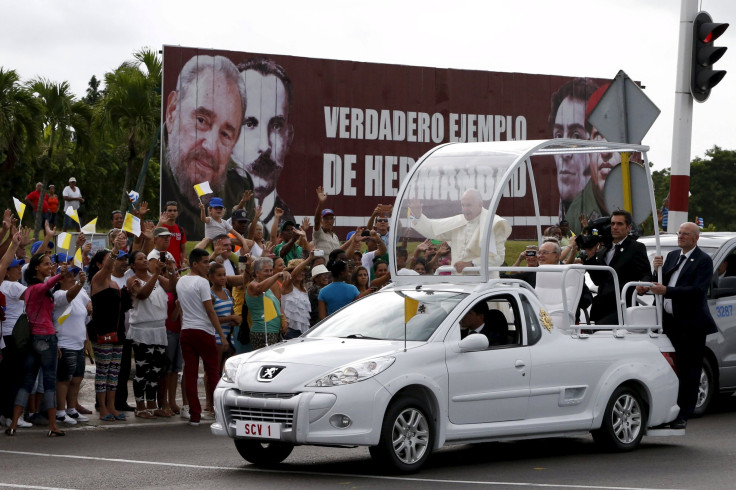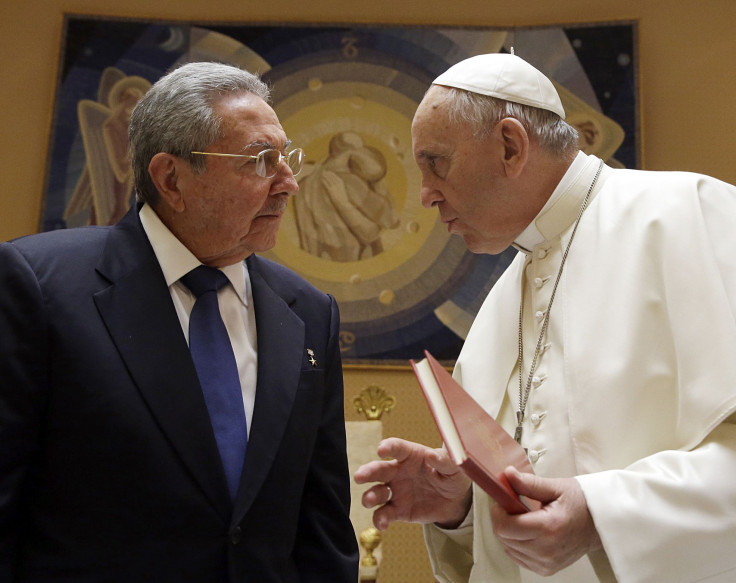Pope Cuba Visit 2015: Will Francis Help End US Embargo?

UPDATE 6:15 p.m. EDT: Pope Francis Saturday urged the United States and Cuba to set an example for the world by " develop[ing] all [the] potentialities " in the pursuit of peace. The pope, who arrived in Havana on the first leg of a trip that will include stops in the United States and Canada, in an arrival speech at Havana airport praised the recent reconciliation between the U.S. and Cuba, which have been at odds for more than a half century.
"I urge political leaders to persevere on this path and to develop all its potentialities ... on behalf of the peace and well-being of their peoples, of all America, and as an example of reconciliation for the entire world," the pontiff said before boarding his popemobile to greet well-wishers.
Francis, who hails from Argentina, brokered the U.S.-Cuba talks that led to renewed diplomatic relations this summer. Cuban President Raul Castro, who like his brother, Fidel, was educated by Jesuits, thanked the pope for his intervention.
Reuters reported Castro used the speech to criticize the continuing embargo against his country and the presence of the U.S. naval base at Guantanamo Bay. President Obama Friday issued new regulations weakening the embargo.
Original post:
It’s a secular country with few Roman Catholics and even fewer churches. But a flurry of excitement has nonetheless swept through Cuba in recent weeks as the island nation prepared for Pope Francis’ three-day visit, beginning Saturday. Pictures of the pontiff adorned buildings and pedicabs, and thousands were expected to celebrate Mass alongside him in Havana’s Revolution Square Sunday.
The papal visit will mark a uniquely profound geopolitical moment as the pope, who brokered the historic rapprochement between Cuba and the U.S. last year, makes his appearance in the Caribbean country days before heading to the North American nation. Observers anticipate he may coax more concessions from both governments, advocating for a complete end of Washington’s 50-year economic embargo on Cuba while quietly pressuring Havana to expand Cubans’ personal freedoms. He is also expected to urge Cubans to overcome deep-seated political and personal animosities, remarks that many Cubans hope will further heal relations with the U.S. after decades of mistrust.
Despite Francis’ popularity in Cuba, however, it’s unclear whether he can help usher in any lasting change on an island whose government has long been at odds with the Catholic Church.
Cubans are “breathing an air of hope in our national life” with the revival of relations with the U.S., Bishop Wilfredo Pino Estevez, based in Cuba’s eastern city of Guantanamo-Baracoa, wrote in a letter to fellow clergy members this month. “It is not easy to live at odds with your next-door neighbor! That is why it is important what the pope is coming to do, as a universal pastor of the church, in search of reconciliation and peace between all people of the earth.”
Cuba’s government announced last week it would release 3,522 prisoners before the pope’s visit, one of the largest prisoner releases since the Communist Party took power in 1959, in a gesture of good will that revealed its respect for the pontiff. That announcement came months after President Raul Castro, who grew up attending Jesuit schools but renounced religion after the 1959 revolution, praised the pope effusively after meeting with him in May.
“I’ve read all the pope’s speeches. If he continues to speak this way, I assure you that I will go back to praying and return to the church,” he said at a news conference at the time. “I’m not joking.”

Pope Francis has previously spoken out against the U.S. economic sanctions on Cuba, and his visit is expected to spur momentum to end the embargo as American lawmakers get set to debate the issue in Congress. But the pope will also be calling on Cubans on and off the island to put aside the political divisions and resentments that have grown since the Communist Party came to power, the Cuban Catholic Bishops’ Conference said this year.
“[Pope Francis] is a bridge-builder, so we hope he will bridge the differences among the Cuban people,” said Sister Ondina Cortes, a Cuban-born assistant professor at St. Thomas University in Miami Gardens, Florida, who has worked with Cuban church leaders. “We need to discover there’s more that unites us than separates us. That’s what I think reconciliation is about.”
Francis played a critical role in reviving ties between Cuba and the U.S., which were frozen in the 1960s because of Cold War tensions and the sweeping American economic embargo on Cuba. He sent personal appeals to both presidents to resolve their differences and hosted talks at the Vatican over 18 months until December of last year, when Castro and U.S. President Barack Obama announced they would restore the relationship between their countries. The two nations reopened their respective embassies in July and August.
The pope is scheduled to visit three Cuban cities before traveling to Washington Tuesday, with both public events and private meetings on his agenda. Castro has said he plans to accompany the pontiff throughout the entire trip, which some media reports have speculated could include a meeting with Fidel Castro, the former leader of the country and the brother of its current president.
However, the pontiff is not scheduled to meet with Cuban dissidents, despite having received a request for a meeting with the Ladies in White, an outspoken activist group, tempering some hopes that he would publicly pressure the Castro administration on human rights. Government officials have arrested dissidents every Sunday for the past 22 weeks to crack down on their activities, most recently detaining 50 members and supporters of the Ladies in White as they were heading to a demonstration after Mass last Sunday.
Christian groups in Cuba are hoping Francis will use his trip to lobby for more religious freedoms in the country, including the return of church property seized by the government after the Cuban Revolution in the 1950s and the reopening of Catholic schools. Dulce Boza, interim executive director of Echo Cuba, a Miami-based Christian organization that provides humanitarian support to Cuban churches, said it would be a disappointment, but not a surprise, should the pope fall short of those goals or make any pronouncements on the human-rights situation in the nation.
Previous popes improved relations with Cuba’s government, but the gestures had little impact on most Cubans’ daily lives, Boza said. “There was the same excitement with the visits of the last two popes, and nothing really changed,” she said.
But Boza said the visit would still solidify Pope Francis’ enormous popularity on the island. The pontiff, who was born in Argentina, has spoken out openly against the U.S. economic embargo on Cuba and criticized the ills of unfettered free-market capitalism -- remarks that have added to his clout on the island, already significant because of his status as the world’s first Latin American pope. “Cubans see him as being a spokesperson for Cuban people,” Boza said.
After a visit to Cuba is likely to ask Pope in his speech to the U.S. congress to lift the embargo on the island pic.twitter.com/OSOWefsGUP
— Nelson Plasencia (@NelsonPlasencia) April 27, 2015Eighty percent of Cubans have a positive opinion of the pope, although 44 percent of them say they are not religious at all and just 27 percent identify as Catholic, according to a survey released in April by the news organizations Fusion, Univision and the Washington Post.
The road toward Pope Francis’ trip stretches back more than 20 years before the announcement of the U.S.-Cuba thaw last year. The Catholic Church was heavily repressed by Cuba’s ruling Communist Party for decades after the revolution, as the government expropriated church property, exiled clergy members over suspected support for the ousted administration and sharply restricted religious activities throughout the country.
But it began gradually relaxing many of those rules in the 1990s with the waning of the influence of the former Soviet Union: A constitutional change made Cuba a secular rather than an atheist state, and Christians were allowed to join the Communist Party. Pope John Paul II made a landmark visit to the island in 1998 that is widely credited with ushering in a new relationship between the church and the government.
After the visit, Christmas was reinstituted as a nationally recognized holiday and the church began taking on an increasingly crucial role as a mediator with the regime. Pope Benedict XVI made his own visit to Cuba in 2012 to bolster those ties.
“The Catholic Church’s voice has been a moderating influence in Cuba and has endeavored to build bridges with the government itself,” said the Rev. Robert Pelton, director emeritus of Latin American/North American church concerns at the University of Notre Dame in Indiana. Cuban dissidents frequently face censorship and even detention for criticizing the government, but church leaders are among the few people who have seen growing space to advocate for reform within the existing political system, he said. The church has also successfully lobbied for the release of political prisoners on several occasions.
“I think his visit will be very productive,” Pelton said of Pope Francis’ trip this weekend. “People have never seen or experienced a pope who was so straightforward and outspoken. I think Pope Francis is the ideal person to make this visit right now.”
© Copyright IBTimes 2024. All rights reserved.












